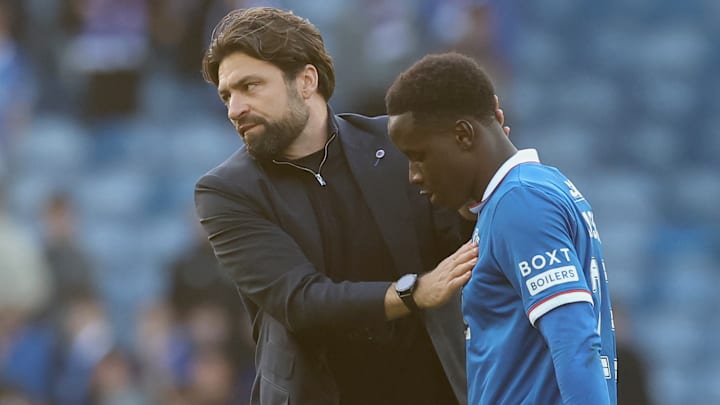Rangers’ 2025/26 Premiership campaign has begun in frustrating fashion, with a lacklustre draw against Dundee marking a continuation of domestic struggles.
The signs are worrying, low tempo, poor cohesion, and a squad seemingly struggling to adapt under Russell Martin’s management.
Yet history offers some perspective, slow starts don’t always spell doom for title ambitions.
Let’s look at some notable examples where both Rangers and Celtic began seasons poorly but still ended as champions.
Rangers 1998/99: A Rocky Start Before Treble Glory
The 1998/99 season kicked off with a new-look Rangers, that had spent over £35m, losing 2-1 to Hearts at Tynecastle.
It was a shock for the eventual champions, yet that stumble barely dented their resolve. Under Dick Advocaat, the side rapidly found its rhythm.
Advocaat reflected later: “We knew early setbacks were part of the journey. The squad was strong, but it took time for everyone to click.
“After that first loss, we regrouped and focused on playing with confidence and intensity. That made all the difference.”
With a squad boasting stalwarts like Gordon Durie, Ian Ferguson and Jorg Albertz, alongside key signings such as Rod Wallace, Arthur Numan and Giovanni Van Bronckhorst, assisted by youngster Barry Ferguson, Rangers went on a lengthy unbeaten run.
They finished the season six points clear of Celtic, winning the league with three games to spare at Celtic Park, and lifted not only the league but the treble.
Early-season losses were quickly corrected by a blend of experience, quality signings, and a clear tactical identity.
Rangers 1986/87: Two Losses in Three, Then a Title
Go back to 1986/87. Graeme Souness’s Rangers lost two of their first three league matches, dropping points to Hibs and Dundee United.
Despite this shaky start, Rangers went on to clinch the title by six points, their first league triumph in nine years, in an era where it was two points for a win.
Graeme Souness once said: “When you’re building a team, the early results don’t always tell the full story.
“We had new players settling in and knew that consistency would come.
“Patience was key, but so was belief in the dressing room.”
The key was Souness’s ability to integrate new signings like Terry Butcher, Chris Woods, and Graham Roberts.
The team gelled as the season progressed, particularly after Christmas, and dominated the league.
Early inconsistency was overcome through tactical adjustments and players settling into new roles.
Now we look at the other side of the city.
Can a winning start define Rangers season? SPFL opening day analysis
Late leveller fails to hide Ibrox ineptitude
5 Things we learned as Rangers stumble to draw with Dundee
Celtic 1997/98: Overcoming Early Defeats to Deny Rangers 10-in-a-Row
Celtic’s 1997/98 campaign under Wim Jansen also began poorly, with back-to-back defeats to Hibernian and Dunfermline.
Nevertheless, they rallied to stop Rangers’ quest for a historic 10th consecutive title by winning the league by two points.
Henrik Larsson reflected years later: “It took time for us to find our rhythm as a team, especially with new players coming in.
“But once we clicked, we felt unstoppable. Those early losses taught us resilience.”
Crucial to their success was the arrival of Henrik Larsson, whose influence grew as the season progressed, despite his initial criticism, alongside tactical clarity and improved team cohesion.
A slow start can be a necessary bedding-in period before key players hit their stride.
Celtic 2021/22: A Slow Burn to the Title
The most recent example comes from Celtic’s 2021/22 season under Ange Postecoglou.
They lost two of their first four matches, including a defeat to Rangers, raising doubts about their readiness, with the club sitting fourth after 10 games played.
Postecoglou said at the time: “Transitions are always difficult. The style we wanted to play required adjustment, and results early on didn’t reflect our potential.
“We had to stick to our process and trust in the players.”
But the team adapted quickly to Postecoglou’s style, embarking on a blistering run from October onwards, dropping just six points in the final 27 league games to secure the title by four points.
Transition seasons require patience, but a decisive upturn in form can transform the campaign.
What This Means for Rangers 2025/26
All these examples share a pattern: initial struggles followed by a rapid, sustained improvement fuelled by tactical clarity, key players finding form, and strong leadership.
Rangers under Russell Martin must find that turning point. Could it be on the 31st when Celtic come to Ibrox?
Martin himself acknowledged post-Dundee: “We’re not where we want to be yet, but I believe in this squad.
“The challenge now is to raise our standards immediately, improve our intensity and start delivering results that reflect our quality.”
The difference today is the lack of any obvious momentum shift. The side looks bereft of the pace, conviction, and intensity that Martin’s system demands.
The defensive frailties and set-piece issues exposed by Dundee underline deeper problems that need urgent fixing.
With European fixtures and an Old Firm clash looming, the pressure to start producing consistent domestic performances is mounting.
But history reminds us that slow starts don’t always derail title hopes, provided the response is immediate and resolute.
Conclusion
Rangers’ poor start to 2025/26 may feel concerning, but it’s far from unprecedented in Scottish football’s recent history.
What sets champions apart is how quickly they right the ship. For Martin’s side, the next few weeks are crucial to prove they can do just that.
